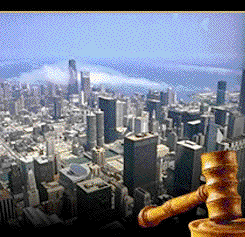ARRESTED? - YOUR RIGHTS

WHAT TO DO UPON ARREST/ENCOUNTERING THE
POLICE
There is no obligation to speak to the
Chicago police or FBI. You may simply and politely walk away if you encounter police and do not wish to speak with them. However, if they attempt to arrest you, do not resist arrest even if they are wrongfully arresting you. If you believe you may be a suspect, it is in your best interest to speak to a lawyer BEFORE you speak to the police.
The
police may and probably will, if they do not have enough evidence or wish to get more, attempt to trick you into speaking with them. Some of the things which police will do to get a person to talk or to sign a confession are clever but one must recognize the tricks and not say a word. The police will promise you that if you tell them or sign a document they will let you go home. You must remember that the job of the police is to gather evidence. They will not let you go home after you tell them what they want to know or sign a confession. They may pretend like they already know so it is okay for you to tell them. They might threaten you or even hit you. They might deprive you of food, water and the use of the restroom. Do not say a word except to say that you want a lawyer or if you have one that you want your lawyer. Repeat that you want a lawyer over and over again to as many people that you encounter.
FUNDAMENTAL RIGHTS
Every citizen of the United States and in some instances non-citizens have certain fundamental freedoms. These freedoms emanate from the United States Constitution, one of the most brilliantly written documents in history. Some of those rights which involve people accused of a crime are the following:

The Sixth Amendment of the United States Constitution.
"In all criminal prosecutions, the accused shall enjoy the right to a speedy and public trial, by an impartial jury . . . and to be informed of the nature and cause of the accusation; to be confronted with the witnesses against him; to have compulsory process for obtaining witnesses in his favor; and to have the assistance of counsel for his defense."
The Sixth Amendment insures that you do not have to wait for a long period of time to get to trial, to get the whole ordeal over with. The Sixth guarantees that you get to pick whether you want the Judge or 12 people from your community decide whether you are guilty or not. Also, the Sixth assures you that if there is someone or something that will help your case your attorney can compel that person to come to trial or to turn over whatever evidence will help us prove your case.
The Eighth Amendment of the United States Constitution.
"Excessive bail shall not be required, nor excessive fines imposed, nor shall cruel and unusual punishments be inflicted."
The Eighth Amendment insures that a bond will be set to allow you to get out while waiting for trial. If your bond is set too high your attorney may be able to get it reduced to an amount you and your family can afford.
The Fifth Amendment of the U.S. Constitution.
"No person . . . shall be compelled in any criminal case to be a witness against himself, nor be deprived of life, liberty or property, without due process of law . . ."
The Fifth Amendment is the basis for which you are not required to speak to police, prosecutors or anyone if you feel you may incriminate yourself. It is also the source or the reason why the police must give you Miranda warnings. Miranda warnings are intended to inform you of certain important rights so that one accused of a crime does not give up all his rights before the ordeal has even begun. It is aimed at informing a person to keep quiet. If the police intend to use what you say at trial they must inform you that: (1) You have a right to remain silent. (2) Anything you say can be held against you. (3) You have the right to
an attorney, if you cannot afford an attorney, one will be appointed for you. (4) If you choose, you may have a lawyer present during interrogation. Finally, The Fifth Amendment also has another purpose. The Fifth requires the government to afford each person some of sort of process in determining guilt or innocence.

POLICE INTERACTION
There are three types of police-citizen interaction. The first is when an officer merely approaches and asks general questions. The law states that an officer may approach and inquire just as anyone can approach and inquire. The law refers to this activity as "the community care taking function" of the police. The second type of encounter is where the police officer has reasonable suspicion that a crime has been committed. In this situation the officer may approach and make an inquiry as to the activities of the suspected individual. If his suspicion is not dispelled and he believes the individual to be armed he may make a protective pat down for weapons. Such a "pat down" involves only patting the outer clothing of an individual for items which feel like a weapon. The third encounter is when the officer has probable cause to believe that a crime has been committed and the subject in question committed that crime. Once arrested or when in jail or at any other time It is of the utmost importance that you do not answer questions unless your lawyer is present.
WARRANTS
Warrants are required to insure that the people are not subjected to arrests made by police on their own whim. Warrants provide opportunity for a judge to review the facts to determine if there is a basis for arrest. A police officer may arrest you without a warrant only under certain circumstances. If a person commits an arrestable offense in the presence of the officer, the officer may arrest without a warrant. If the police have reasonable grounds to believe that a warrant does exist for your arrest, the officer may arrest without a warrant. Finally, if the officer has probable cause to believe a crime has been committed and a particular person committed that crime he may arrest that person.
AFTER ARREST
As stated above you don't have to speak with the police. If they force you to speak resist as long as necessary to create some evidence. If they bruise or cut you this will assist in your case in showing that you were forced to speak or do whatever. Most people believe, because of movies, that you are allowed one phone call, however the rule is actually that within a reasonable time after being taken into custody you have a right to make a reasonable number of telephone calls to alert your family or lawyer. If you are moved, again you can make a reasonable number of calls. The police may arrest you and keep you detained for a reasonable time period. Generally, approximately 48 hours has been deemed a reasonable time. If the police and/or the prosecutor want more time they can petition a judge to be allowed more time. The judge may allow the police to hold you longer. If the police tell you that you are not under arrest you do not have to stay at the police station. Ask if you are under arrest. If they tell you no, politely and calmly begin to walk away and inform the police that you are leaving because you are not under arrest.

Comments or questions?
Send an email. Answers within a few hours - sometimes instantly.